Lost In Myth: A Tale of Two Kates—Why You Can’t Escape Fate
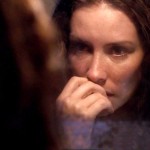 Have you ever met someone for the first time who seemed really familiar to you? Strangely, this person likely wound up being an important player in your life. This exact scenario happens to Jack in LA X when he recognizes Desmond on the plane. In What Kate Does, Kate’s parallel life is once again setting up the scene for her to have a connection with Claire and baby Aaron. What if the reason for this familiarity is because we are recognizing these people from our future, or from the story of our destiny?
Have you ever met someone for the first time who seemed really familiar to you? Strangely, this person likely wound up being an important player in your life. This exact scenario happens to Jack in LA X when he recognizes Desmond on the plane. In What Kate Does, Kate’s parallel life is once again setting up the scene for her to have a connection with Claire and baby Aaron. What if the reason for this familiarity is because we are recognizing these people from our future, or from the story of our destiny?
In the February 4th “Official LOST Audio Podcast,” Damon Lindelof insists that the “flash-sideways” we’re seeing in Season 6 are in fact not alternate timelines. In other words, they do not have any lesser value than the other timeline and both are of equal importance. For this reason, I will refer to events of the flash-sideways as occurring in a parallel timeline. This does not necessarily mean that the events are happening along side each other. As I pointed out last week (in “What the LA X in ‘LA X’ Really Refers To”), it is entirely possible that this off-island timeline will occur after the island storyline ends and what we are seeing is the resolution of the characters in the show.
Of course, it’s also possible that the two timelines are occurring alongside each other. If this is the case, it is likely that these ripples in time will eventually merge once the flash-sideways events of 2004 catch up to 2007. This may cause a continual loop that leads to the Losties (and the world) being stuck in time (similar to the Star Trek TNG episode “Cause and Effect” written about in “’Follow the Leader’—Can Changing One Moment Change Everything?”).
Whether the flash-sideways is occurring alongside the other timeline or will occur afterwards, since time is an illusion anyway, the mythological message is similar. The island can represent a realm where you create the story of your destiny, after which, you’re born into a life where you get to experience it. So, whereas in most of my mythological interpretations of the show, I describe the island as a metaphor for our world on earth, in this case, I’m reversing it by saying that the island could also be seen as a metaphor for a heavenly realm where we write the story of our lives. That’s the beauty of mythology: its metaphors lend itself to many interpretations as millions of Lost fans can attest to.
Imagine if before we are born, our soul (energy, karma, light, essence, player of the video game of life, etc.), decides on the story it wants to experience in this lifetime. It chooses the people and events that will help it to grow past the issues it had experienced in its last lifetime. So, the people who are the closest to you will likely challenge you with your biggest issues since these issues will take the longest to resolve. That’s why, as they sing in the Broadway play Avenue Q, “The More You [Love] Someone the More They Drive You Crazy.” Your family, loved ones, and coworkers are put into your life to help you overcome your biggest issues.
Some faiths even claim that we continually get reincarnated with the same set of souls lifetime after lifetime. So your best friend now could’ve been your father or mother in a previous life. Your lover could’ve been a teacher or competitor. Your boss could’ve been an enemy on the battlefield. We keep coming back with these same souls to work out these issues, just as the Losties seem to be doing in their parallel timeline, and these connections and experiences have all been planned in our soul story from the start.
From a narrative perspective, this spiritual metaphor is easier to understand if the flash-sideways is happening after the events of 2007 because it’ll give us a sense of 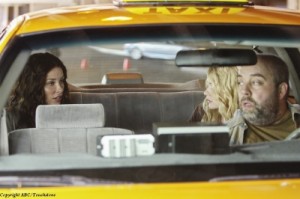 closure. Yes, Kate started out on the run in this new timeline, just as before, but in “What Kate Does,” we see her do something that goes against her nature. Instead of running away from a problem she has created, she endangers herself by trying to make it right. By coming back to help Claire and going with her to the hospital, she puts her own life at risk for someone else. That’s redemption. Getting into the cab that was occupied by Claire is, of course, no accident. It is fate pulling the strings to enable Kate to experience a test she was always meant to have.
closure. Yes, Kate started out on the run in this new timeline, just as before, but in “What Kate Does,” we see her do something that goes against her nature. Instead of running away from a problem she has created, she endangers herself by trying to make it right. By coming back to help Claire and going with her to the hospital, she puts her own life at risk for someone else. That’s redemption. Getting into the cab that was occupied by Claire is, of course, no accident. It is fate pulling the strings to enable Kate to experience a test she was always meant to have.
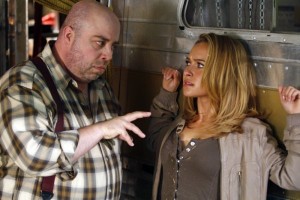 Speaking of “pulling the strings,” Heroes fans may have recognized the cab driver from that scene as David H. Lawrence XVII who plays “Puppet Master” Eric Doyle on the series. Doyle is a villain who can control people’s actions, and he especially likes doing so to the cute blonde on the show, Claire (the cheerleader). Was this a purposeful hint from the Lost producers or one of those happy coincidences set up by the puppet masters of our universe? Either way, the message is once again that Lost is simply giving us hidden messages that reveal truths about our world.
Speaking of “pulling the strings,” Heroes fans may have recognized the cab driver from that scene as David H. Lawrence XVII who plays “Puppet Master” Eric Doyle on the series. Doyle is a villain who can control people’s actions, and he especially likes doing so to the cute blonde on the show, Claire (the cheerleader). Was this a purposeful hint from the Lost producers or one of those happy coincidences set up by the puppet masters of our universe? Either way, the message is once again that Lost is simply giving us hidden messages that reveal truths about our world.
If our life story really is all planned out before we come to this world, it really could explain some of the more bizarre mysteries we experience here. As stated above, when we recognize some of the key players from our destiny we can get a sense that we already know someone the moment we meet them. This could also explain love at first sight—your soul is instantly recognizing someone from your future that you are destined to have a soulful connection with. The soul doesn’t experience time, it is eternal, so it can recognize another soul from a future time or a past life. It may also just resonate with meeting someone from your predetermined chosen path—someone who is meant to help you successfully navigate it.
Another weird phenomenon this may explain is déjà vu. What if the phenomenon happens when you experience an event that your soul had planned to experience—particularly, a key event that would be pivotal for your destiny? Remembering this event as it occurs brings about a sense of déjà vu. Using Lost as an analogy, perhaps Kate got déjà vu helping Claire with her pregnancy. And if she goes on to help deliver Aaron, the feeling may really resonate. On Lost, the reason is because she has 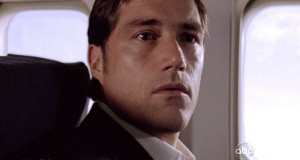 already helped deliver Aaron on the island. In life, it’s a metaphor for an event that was destined to happen—a person’s soul created a scenario to help eliminate their own selfish behavior by one day unselfishly helping someone else. Once this event actually transpires, you get déjà vu. Judging by Jack’s expression after he stares out of the window of the plane in the parallel timeline, the show is acknowledging this phenomenon. And if Sawyer and Juliet eventually go Dutch over a cup of coffee in the parallel timeline, perhaps they will have the feeling too. At the very least, it might be love at first sight. (Sorry Skaters and Jaters.)
already helped deliver Aaron on the island. In life, it’s a metaphor for an event that was destined to happen—a person’s soul created a scenario to help eliminate their own selfish behavior by one day unselfishly helping someone else. Once this event actually transpires, you get déjà vu. Judging by Jack’s expression after he stares out of the window of the plane in the parallel timeline, the show is acknowledging this phenomenon. And if Sawyer and Juliet eventually go Dutch over a cup of coffee in the parallel timeline, perhaps they will have the feeling too. At the very least, it might be love at first sight. (Sorry Skaters and Jaters.)
Being that we seem to live in a realm of freewill however, what happens when we don’t successfully make the decision that will lead to our redemption? What happens when a young pregnant woman gives up the baby she was meant to raise herself or a former torturer keeps following orders to kill other people? Well, in the case of Claire and Sayid, you become taken by the dark side; 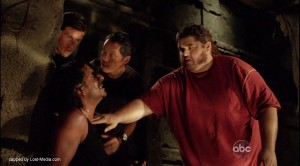 possessed by a desire to do for the self alone. You do not make the hard choices; you are controlled purely by life circumstances and react to them. In a word, you become a zombie. Damon and Carlton had jokingly threatened that Season 7 would be the zombie season, but it would seem that it may have been Season 6—despite Sayid’s denial at Hurley’s accusation (a little head nod to the fans).
possessed by a desire to do for the self alone. You do not make the hard choices; you are controlled purely by life circumstances and react to them. In a word, you become a zombie. Damon and Carlton had jokingly threatened that Season 7 would be the zombie season, but it would seem that it may have been Season 6—despite Sayid’s denial at Hurley’s accusation (a little head nod to the fans).
Once you’ve been taken by the dark side, can you escape? Yes, but often it will require much harder sacrifices than what was originally required, if only because after sinking further down you have that much further to climb up. Sometimes, you sink so low that the ultimate sacrifice is required, as Anakin Skywalker found out in Return of the Jedi. Most of the time though, the challenges, while difficult, are not overwhelming and the universe will continually offer you opportunities to take them on. But the harder you fight against these challenges, the more aggressively the universe will throw them back at you. In other words, what you resist, persists.
 The whole zombie resolution opens up a lot of possibilities on Lost. Is the reason why Richard Alpert has never aged because he was a zombie all along? Are Claire, Yemi (Mr. Eko’s brother) and Christian Shephard also zombies? If so, why would zombie Christian go through the trouble of wading out to sea where Jack saw him standing in Season 1? Was it just for the creepiness factor? His body couldn’t have been there because the “Missing Pieces” episode (acknowledged as canon) showed him on the island already before Jack even woke up. And, more importantly perhaps, how did he appear to Jack off island in the hospital in Season 5? On the other hand, since the smoke monster can take the form of the unburied dead without the need to posses the body, has he just taken the form of Christian, Claire, and Yemi? Has he also taken the form of the people who were the Adam and Eve skeletons from Season 1? Is that who Charles Widmore and Eloise Hawking are? When we first saw Jacob’s enemy, aka, the man in black, was this his original appearance, or was he simply taking the form of a dead person too?
The whole zombie resolution opens up a lot of possibilities on Lost. Is the reason why Richard Alpert has never aged because he was a zombie all along? Are Claire, Yemi (Mr. Eko’s brother) and Christian Shephard also zombies? If so, why would zombie Christian go through the trouble of wading out to sea where Jack saw him standing in Season 1? Was it just for the creepiness factor? His body couldn’t have been there because the “Missing Pieces” episode (acknowledged as canon) showed him on the island already before Jack even woke up. And, more importantly perhaps, how did he appear to Jack off island in the hospital in Season 5? On the other hand, since the smoke monster can take the form of the unburied dead without the need to posses the body, has he just taken the form of Christian, Claire, and Yemi? Has he also taken the form of the people who were the Adam and Eve skeletons from Season 1? Is that who Charles Widmore and Eloise Hawking are? When we first saw Jacob’s enemy, aka, the man in black, was this his original appearance, or was he simply taking the form of a dead person too?
So far, Season 6 seems to be bringing up more questions than it’s answering. Every time it answers one, it gives us three more. Whether or not we ever get any satisfying answers to Lost, I think the show has been more than redeemed in the answers it has given us about life. Helping us to understand why we’re here is really the biggest question that the show is helping us to answer. Sure, most of the wisdom is only coming through on a subliminal level, but it is coming through. And, this wisdom is helping to make us stronger so that we will be able to better navigate the challenges in our own lives. This is why most fans feel that Lost is more than a show. It’s a guide to our own redemption.
Marc Oromaner is a New York City writer whose book, The Myth of Lost offers a simple solution to Lost and uncovers its hidden insight into the mysteries of life. He can be contacted in the discussion section of The Myth of Lost Facebook page.
The Myth of Lost is available on Amazon and barnesandnoble.com.



2 Responses Leave a comment
If there’s a Doyle clue given by the casting of the taxi driver, it’s to Arthur Conan Doyle, author of the short story that “Lost” was named for, was adapted from, and includes a great number of other, often very amusing, clues to.
Interesting, though Eric Doyle was the character that David H. Lawrence XVII played on “Heroes.” So perhaps it was their nod to the author.